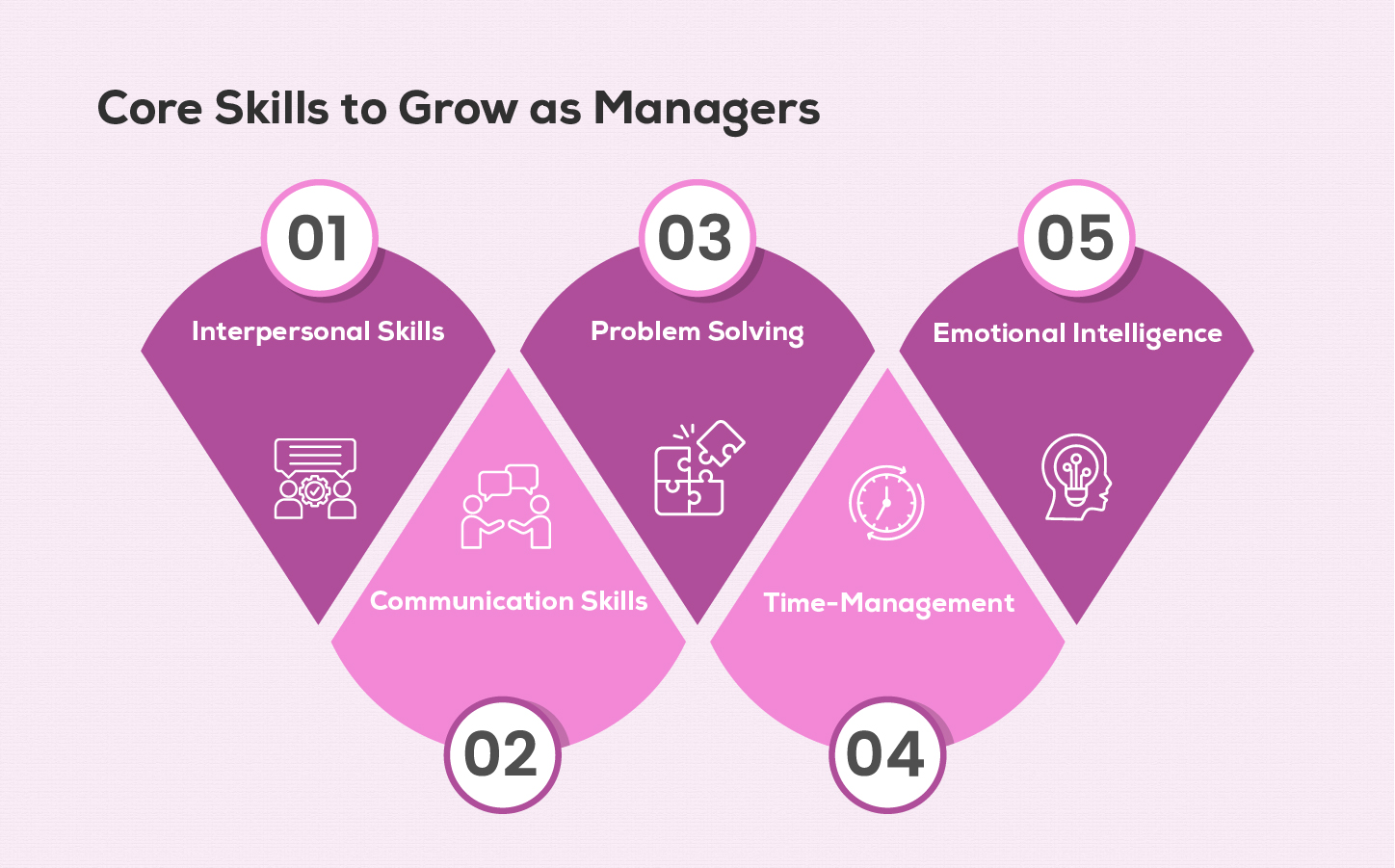Advancing into a management role reshapes a professional's responsibilities dramatically. This transition from being an individual contributor to a manager requires honing strategic leadership skills, building a resilient team, and making a notable impact within the organization.
For professionals stepping into this role, critical questions often arise about effective team guidance and the essential skills necessary for managerial effectiveness.
- How can one effectively lead a team?
- What are the key skills needed for a successful manager?
- How can one address and overcome the challenges that come with management?
The answer to these questions lies in “First Time Managers Training”. Read through this blog to gain vital insights and strategies that equip new managers for success.
What is a First-Time Manager?
An individual who has recently transitioned from an individual contributor role to a leadership position for the first time is known as a 'First-time Manager'. Unlike previous roles that focused on personal performance, this new position requires overseeing team dynamics, guiding collective goals, and contributing to broader organizational success.
This shift brings a new set of responsibilities—leading people, managing performance, making strategic decisions, and aligning team efforts with company objectives. It also introduces a different mindset, where success depends not just on task completion, but on communication, delegation, and the ability to support and grow others.
For many, this transition marks a defining point in their career journey. It sets the foundation for long-term leadership development and influences how they build trust, make decisions, and shape team culture.
Essential Skills for New Managers
Stepping into a management role demands a refined skill set essential for effective leadership. To achieve success and establish a positive team dynamic, aspiring managers must master these crucial abilities. Let’s delve deeper into the skills that a new manager needs to develop.

1. Interpersonal Skills
A management role primarily involves people management. Building strong relationships with the team members is essential for creating a positive work environment and motivating the team. To enhance these skills, managers should focus on active listening, empathy, and respect for diverse perspectives.
2. Communication Skills
Effective communication is vital for a team manager. Bridging the gap between the team and senior management requires proficiency in written, verbal, and listening skills. As a manager, one will have to interact with a diverse group of people across the organization and must select the most appropriate communication channels, including emails, presentations, social platforms and meetings.
3. Problem Solving
At the core of managerial role is the ability to solve problems. By paying close attention to details, identifying issues, analyzing them, and developing effective solutions, a manager ensures that the team remains productive. Additionally, developing creative thinking and encouraging teams to adopt such an approach is important for achieving success. Making informed decisions is also a vital skill for managers.
4. Time-Management
Effective time management is essential for managers, as it directly impacts their own productivity and that of their team. Managers should adeptly handle their time including, breaks, unplanned meetings or work scheduling. By prioritizing tasks efficiently, teams can boost productivity reduce frustration among employees, prevent missed deadlines, and reduce suboptimal decision-making.
5. Emotional Intelligence
Emotional Intelligence profoundly influences new managers' ability to understand and manage their team's emotions. This competency lays the groundwork for a harmonious office culture and sharpens strategic thinking. Managers well-versed in emotional intelligence excel in inspiring team members, defusing tensions, and remaining level-headed during crises, which in turn fosters innovative thinking.
Top 3 Challenges Faced by New Managers
Heading into the world of a new managerial role is a journey of learning and growth. Being a manager can often be complex and leading a team can be tough. Here are some of the top challenges managers are facing today:
1. Managing Conflicts within the Team
Conflicts within a team are inevitable and, if not addressed promptly, can lead to significant disruptions in productivity and morale. Managers must act decisively to resolve these disputes before they escalate into major issues. Inadequate conflict resolution can perpetuate a cycle of miscommunication and tension, undermining the company’s values and eroding a cooperative work environment.
How should Managers deal with Conflicts?
Managers must conduct a thorough analysis of conflicts and uphold a company culture that promotes open communication and respect to avoid detrimental impacts on team dynamics.
2. Making the Right Hiring Decision
Selecting a candidate who does not align well with the company's culture or lacks the necessary skills can lead to significant workplace disruptions. This mismatch can decrease productivity, increase turnover, and negatively impact team morale. Neglecting to secure the right fit goes beyond skill and experience mismatches; it also jeopardizes the integrity and cohesion of the team.
What are the possible solutions to overcome this challenge?
It is advisable to implement comprehensive selection assessments. These assessments allow managers to accurately evaluate both the skills and cultural fit of candidates, thereby strengthening the hiring process and enhancing workplace cohesion.
3. Being a Constant Source of Motivation
A significant challenge for managers is sustaining employee motivation, especially when faced with routine and monotonous tasks. This difficulty can lead to a noticeable dip in team engagement and productivity, posing a risk to overall performance and morale.
How can managers boost motivation?
Managers can boost motivation by linking tasks to career development and organizational goals. They can further inspire their teams by highlighting task importance, acknowledging individual contributions, and showing appreciation for their efforts.
Key Strategies for New Managers to Succeed

1. Introduce Yourself
Upon asssuming a new managerial role, the first step should be to introduce oneself to the team. This not only sets establishes a foundation for a collaborative environment but also lays out the path to future success. Take the time to learn their names, roles, responsibilities and background in order to create a welcoming environment.
Tip 1: Clarify that you are open to questions and feedback during the first meeting.
2. Regular One-on-One Meetings
One-on-one meetings provide a space for constructive feedback and conversations around areas for improvement. They also serve as opportunities to recognise team members’ accomplishments and contributions. When conducted consistently, these meetings help align individual goals with team objectives and contribute to a supportive and focused work environment.
Tip 2: Use non-verbal cues such as, eye contact, nodding, hand gestures and open body language to show attentiveness and engagement.
3. Integrating Team and Company Objectives
Aligning team members with the company’s objectives helps establish a clear sense of direction. When employees understand expectations and how their work contributes to broader organizational goals, they are more likely to pursue meaningful and measurable professional outcomes.
Tip 3: Encourage your team to connect their current tasks with the skills and experience relevant to their desired career path.
4. Establishing Clear Performance Goals
Defining measurable Key Performance Indicators provide a clear framework for evaluating team performance. When goals are clearly outlined, employees can better identify areas for skill enhancement and knowledge development. Clear targets also make it easier to pinpoint where progress stalls and offer guidance to help complete tasks more efficiently.
Tip 4: Set SMART Goals – Specific, Measurable, Achievable, Relevant and Time-Bound to track progress and ensure alignment with broader objectives.
The 30-60-90 Rule for a New Manager
The 30-60-90 rule provides a structured framework that guides new managers through their first three months by setting clear, phased goals. It helps them transition smoothly, build credibility, and begin making an impact.
-
Days 1–30: Learn and Build Trust
The first month focuses on observation and understanding. New managers spend this time learning about the team, understanding roles and responsibilities, adapting to the company culture, and building rapport. Establishing trust and listening actively are key during this phase.
-
Days 31–60: Contribute and Collaborate
With a solid foundation in place, the next 30 days involve offering insights and contributing ideas. Managers begin identifying opportunities for improvement, strengthening relationships with stakeholders, and collaborating with other departments to align on broader goals.
-
Days 61–90: Lead and Drive Impact
By the third month, new managers move into active leadership. Having built relationships and gathered insights, they start setting performance goals, driving execution, seeking feedback, and guiding the team toward measurable outcomes.
Real-Time Examples
Transitioning into a management role can be demanding, and many organizations understand the value of equipping their new leaders with the right support. Personalized development programs have become an effective approach to help first-time managers build essential leadership capabilities.
To better understand how organizations support new managers, here are a few real-life examples of structured development programs in action.
Example 1: Microsoft’s “Model, Coach, Care” framework is designed to guide managers in building strong teams through continuous learning and a growth mindset. The program encourages leaders to model desired behaviors, coach for performance, and care for their teams’ well-being—reinforcing a culture of development and accountability across all levels.
Example 2: Cisco offers a range of leadership programs tailored to different management levels. The Global Leader and Technical Leader Programs focus on aligning business goals with global priorities while embracing cultural diversity. The Business Leader Program uses interactive simulations to build real-world business skills. For new managers, the Manager Assimilation Program fosters early team alignment, while the Leadership Fellows Program allows senior leaders to work on nonprofit projects, expanding their perspective and impact.
Conclusion
Stepping into management for the first time redefines how professionals think, act, and influence those around them. It’s a role that demands more than task execution—it calls for clarity in direction, consistency in communication, and the ability to lead by example. The journey may begin with learning and adjustment, but it gradually becomes an opportunity to empower others, strengthen collaboration, and drive progress. With the right mindset and support, new managers can evolve into leaders who leave a lasting impact—not just on outcomes, but on people.







